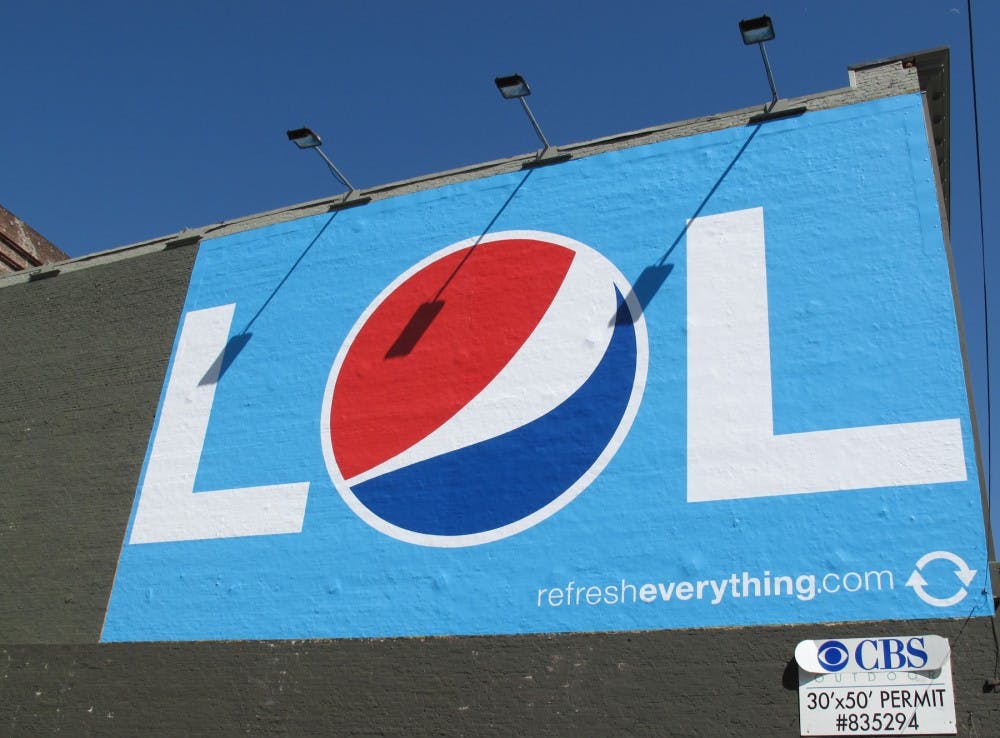Love or hate them, keep up with or renounce them, the Kardashian-Jenner clan and its affiliates (most recently: sugar-coated hair vitamins, the Cleveland Cavaliers and Blac Chyna) are almost comically inescapable. And the family members themselves do, undeniably, wield a lot of power in this nation, especially among millennials - which is why Kendall Jenner's recently released ad campaign for Pepsi is so upsetting.
Jenner is the eleventh-most-followed Instagram user in the world, boasting a fanbase of around 77 million on the app. Over 21 million follow her on Twitter, and while this may seem perilously low compared to the former figure, mirrored with some of her peers (Gigi Hadid's four million, Hailey Baldwin's almost one and Karlie Kloss' mere two million), Jenner reigns far superior.
So, it makes sense that Pepsi tapped her for its latest ad campaign. In the commercial, released April 4, Skip Marley's "Lions" pulsates in the background while Jenner rips off a blonde wig during a photoshoot and bounds into a crowd of protesters - after grabbing an icy can of Pepsi, of course, which she later hands to a police officer.
The "protesters," all sheathed in aesthetically cohesive shades of blue, are thrilled to be in the street and even more thrilled to be hoisting signs in the air that implore people to "join the conversation" and "love."
Which conversation? Love what?
The protester/police clash depicted in the ad has been most compared to protests of the Black Lives Matter movement, first galvanized in 2013 with George Zimmerman's exoneration. Considering Pepsi's public campaign to reach millennials, the ad's superficial, ambivalent nature seems to suggest that they don't - and shouldn't - care.
One day after its less-than-triumphant release, Pepsi pulled the ad and pinned an apology to their Twitter page, ceding that they had "missed the mark." Jenner, so excited to promote it on April 5, deleted it from her own account by the next day after vicious public backlash (My personal favorite: a Tweet that read, "Michael Jackson almost burned alive on the set of a Pepsi commercial and today that became the second worst moment in Pepsi history").
Just as I don't believe all films are obligated to tackle important societal issues, I don't expect all celebrities to espouse messages of social justice with every Tweet they fire off or ad campaign in which they participate. But celebrities' voices reach farther than most average citizens'; it's crucial that they use these voices to broach meaningful and topical subjects, not borderline slander them.
In 2015, TIME magazine deemed Jenner so important that she earned a spot on their "30 Most Influential" list, along with her sister Kylie. This is a list populated by some child stars, yes, but also a high school student who invented a new way to test for Ebola, and Nobel Peace Prize winner Malala Yousafzai.
Jenner is no Nobel Prize winner, nor is she even a contender. But almost 100 million people, collectively, track her on social media. When she kicked off a sultry Calvin Klein campaign, the company's sales rocketed by 13 percent. Until a few years and a Beyoncé pregnancy announcement ago, she held the title of Most-Liked Instagram Photo of All Time.
Kendall Jenner clearly has the ability to reach a significant amount of people, primarily those of the young and impressionable variety. It was Pepsi's responsibility to recognize this and use her influence as a tool to either harmlessly promote its brand or support a genuine, specified cause - not portray protester/police clashes as little more than optimal Instagram photo backdrops.
This ad is worse than apathetic. It encourages those who do see protesting as something trendy, not necessary, and exacerbates the false notion that millennials can't comprehend real issues.
Miami: if you needed any further reason for switching to Coke, other than the fact that it's objectively better, check it out.

